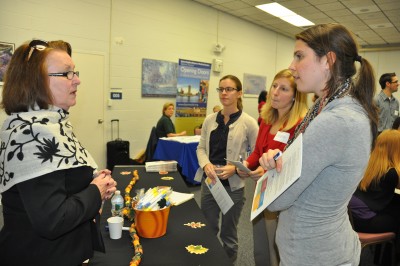
The practice of physical therapy is directing the restoration of function and the prevention of disability accompanying disease, injury, or loss of a body part. Physical therapists can change the way people live their lives.
Current first-year students of the Neag School of Education’s Department of Kinesiology chose the Doctor of Physical Therapy Program (DPT) with that desire in mind. As a graduate of the three-year, post-bachelor’s program, the 17 members of the 2014 class will be able to go on to practice in a wide range of settings.
According to DPT Director and Professor of Kinesiology, Craig Denegar, Ph.D., PT, the program has evolved from the original bachelor’s degree program to an integrated bachelor’s/master’s program into the DPT which began in 2007. The DPT has grown and developed just as he and others had hoped.
With the transition to the DPT, UConn has experienced an increase in diversity of disciplines and richness of students coming in from programs across the country, Dr. Denegar said. Non-traditional students, like those with backgrounds in education, or business, for example, are incredibly valuable in creating a flourishing learning environment.
“I think you should learn as much from your classmates as you do from the faculty,” said Dr. Denegar.
Many DPT students indicated that the hands-on, clinical education, small class size and faculty expertise particularly attracted them to this nationally and internationally recognized program.
“I was accepted into other programs, but I was immediately drawn to UConn’s,” said Ben Wicki, who received his B.S. in exercise science at Sacred Heart University last May. “There are constant opportunities to help with current research, shadowing and observation of patients in all different settings.”
This level of interaction in early patient exposure helps student progress and gain proficiency in skills. The professional but close-knit environment further fuels comprehension with the constant exchange of feedback.
“Our program introduces us to and immerses us in clinical learning situations early on,” said Elizabeth Leslie, who worked a few years at a New Hampshire insurance company before returning to school.
“Currently I’m spending four hours of class time a week in a hospital setting observing and assisting with physical therapy care…It’s getting me ready for my first full-time hospital affiliation this upcoming summer,” she continued.
The emphasis on evidence-based medicine, as opposed to problem-based learning, was another popular lure, especially for students like Jesse Lang. Lang, who enjoys how the DPT forces students to support treatments with the most current evidence available, received a B.S. in exercise science at the University of New Hampshire before working toward a Ph.D. at the University of Maryland and UConn. He left medical school and switched gears with the DPT program.
“They teach us how to use clinical prediction rules to think scientifically and not rely on anecdotes or theory,” said Lang.
Many students in the program knew early on that physical therapy was the career path they wanted to pursue and prepared accordingly with pre-requisite requirements, internships and real world exposure to the industry.
Exercise science graduate, Abby Gordon, for example, had family members and friends who required physical therapy over the years and decided to return to UConn after working four seasons with the Connecticut Sun Basketball team as their travel coordinator and equipment manager.
“I worked in athletics and observation of athletes recovering from injury helped confirm that helping people heal would be a meaningful career for me,” said Gordon.
Like Gordon, Tom Kassan’s passion for physical therapy derived from personal experience. After tearing, repairing and undergoing physical therapy for his anterior cruciate ligament, Kassan gave up his original plan of attending law school to achieve what he discovered to be a more fulfilling way to spend his life.
“I saw how rewarding it was for my therapist to get me back to health and I knew that being able to provide this to my patients would make for a very rewarding profession,” said Kassan. “I love the constant interaction with patients and being able to help them get back on their feet without using drugs or invasive surgeries. I think it’s amazing how much we can do with using just our brains and hands.”
Other non-traditional students, however, came across their interest later on, like JungSoo Kim, who received a B.S. in chemistry as an undergraduate or Rob Pritchard who double-majored in history and political science.
Regardless of their original career paths or backgrounds, all 17 first-year DPT students have a mutual passion to help patients in need, educating them to see beyond the diagnosis for a healthy recovery.
To do so, the 2014 class believe confidence, compassion, trustworthiness and good communication skills are key to future success. Like anything else in the medical field, thinking on your feet in determining the source of the problem, interventions and the likelihood of an appropriate outcome also come along with the territory.
“Knowledge, intelligence and analytic ability are essential,” said Lang. “Add to that intuition, a friendly, likeable personality and a gentle touch. Also, the desire to constantly improve.”
The DPT program was recently recognized by the Commission on Accreditation in a Physical Therapy Education with national accreditation. The renowned faculty has attributed to the success, making students feel less like a number and more like a person, as one said.
“Our professors are all practicing PTs, so we’re learning up-to-date/real-life material on a daily basis,” said Kassan. “Although every professor brings a unique perspective and knowledge set to the program, Dr. Denegar has really allowed me to realize the great potential of being a physical therapist. Watching him diagnose and problem solve is just amazing and I can’t wait until I’m able to reach that ability.”
For more information on the DPT program, contact Dr. Denegar at craig.denegar@uconn.edu.
 Facebook
Facebook
 Twitter
Twitter
 LinkedIn
LinkedIn
